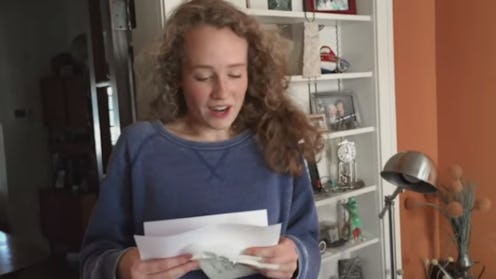
I can still remember the exact way I felt upon reading my college acceptance letter, and it's likely something very similar to what you recall — joy, excitement, anticipation, nerves, pride, all of the above. But thanks to Goodby Silverstein & Partners and production company Prettybird, college acceptance letters are getting a jarring but oh-so important makeover as part of Unacceptable Acceptance Letters, a super powerful campaign fighting campus rape culture. In the print ad, which broke in this weekend's edition of the Harvard Crimson, a mock acceptance letter aimed at students everywhere began much like you might expect — that is, with congratulations on the hypothetical student's acceptance. Soon, however, the congratulatory tone turns to apologetic as the fictional Director of Admissions apologizes in advance for the rape the hypothetical student will likely suffer during their time at the school.
Beneath the faux acceptance letter sits a troubling statistic: "One in five women are sexually assaulted in college." And beneath that, a reminder: "If they accept you, don't accept this. Don'tAcceptRape.com." That knot you're feeling in the pit of your stomach right now is the same as mine ... a visceral reaction to a very ugly truth. Sexual assault and rape are occurring on college campuses at a monstrously high rate. Rape culture is real, and it is thriving on college campuses across the country.
In addition to the print ad, the campaign has launched a series of short films spoofing the typical high school student's reaction while reading their college acceptance letter. The juxtaposition is haunting — fresh young faces more alive than ever with the possibility of the future excitedly reading about their impending rape at the very place they hoped to segue into adulthood. No one should have to live in fear that pursuing an education will ultimately result in sexual assault, or that reporting that assault will result in harassment, shaming, and possibly even being forced out of the school. That is the tragic reality for students today, though. Without some major clap-back from survivors and supporters (see: the #Don'tAcceptRape hashtag), as well as campus judicial reform, rape culture will continue to be an issue every year.
"The first six weeks of college is the period when freshmen have the highest likelihood of being raped," GS&P executive creative director Margaret Johnson told AdWeek. "So we timed our campaign to raise awareness at the earliest point when college becomes a reality — the time when incoming freshmen receive their acceptance letters."
To underscore why this campaign is so relevant, check out the "Unacceptable Acceptance Letters" compilation video below, then review some of the shocking statistics regarding campus rape after the jump. Because this cannot stand.
1. Between 20 and 25 percent of women will suffer a rape or attempted rape while in college.
That's one in five young women. Mull on that for a minute. Think back to your time in college, and the amazing women you met there, some of whom remain dear friends to this day. Imagine if that one in five was you, or your BFF.
2. Women aged 17 to 24 in college are three times more likely to suffer sexual violence than women in general.
There remains some debate about this subject. Research published in a 2014 special report by the Department of Justice estimates that women ages 18 to 24 in college are three times more likely than women the same age not enrolled in college.
3. In one in three sexual assaults, the perpetrator is intoxicated.
While we often hear the ridiculous justification that a rape wasn't a rape because the victim had been drinking, we hear far less about this statistic: 69 percent of sexual victimization incidents on campus involve the perpetrator drinking alcohol, according to the Bureau of Justice Statistics' "National College Women Sexual Victimization."
4. Male college-aged students are far more likely to be victims of rape or other sexual assault than men in general.
Men are victims of rape too, particularly those in college — men in the 18 to 24 demographic attending college are an astounding 78 percent more likely to be a victim of rape or sexual assault than their peers, according to the report by the Department of Justice.
5. Most female students experience sexual assault during their first two years on campus.
For many of us, the freshman and sophomore years of college were some of the best times of our lives. According to a study titled "An Examination of Sexual Violence Against College Women," 84 percent of the women who did report sexual assault indicated that those two traditionally glee-filled years were when the first incident occurred.
6. Only 20 percent of female student survivors 18 to 24 report their assault to law enforcement.
Rape culture on college campuses can easily translate into a hostile environment for victims. In addition to the typical (unmerited) shame many survivors feel, college survivors suffer great anxiety over hazing, harassment, and retribution by the university ... not to mention their attacker. According to the report by the Department of Justice, 80 percent of sexual assaults on campus are not brought to the attention of the police.
7. Roughly one-third of college-going women who have been raped admit to contemplating suicide.
According to the book I Never Called It Rape: The Ms. Report on Recognizing, Fighting, and Surviving Date and Acquaintance Rape by Robin Warshaw, 30 percent of students who have been raped say they harbor suicidal thoughts, and that number only includes the women who opened up about their struggles. This estimate is likely low, making it all the more troubling.
Images: The Unacceptable Acceptance Letters/YouTube